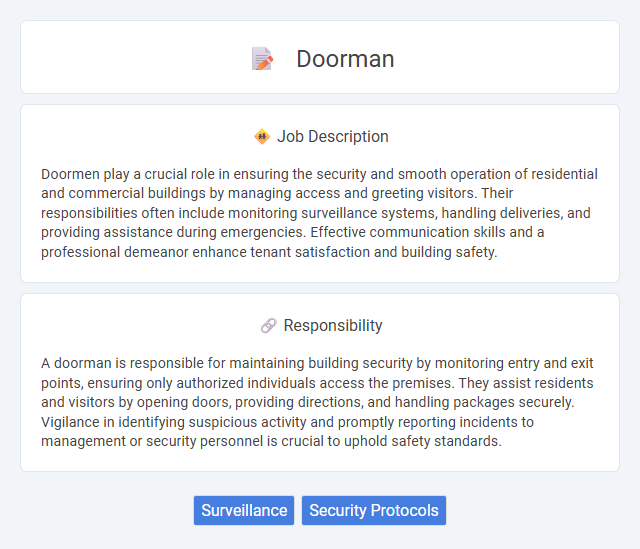
Doormen play a crucial role in ensuring the security and smooth operation of residential and commercial buildings by managing access and greeting visitors. Their responsibilities often include monitoring surveillance systems, handling deliveries, and providing assistance during emergencies. Effective communication skills and a professional demeanor enhance tenant satisfaction and building safety.
Individuals who possess strong interpersonal skills and maintain a calm demeanor are likely suitable for a doorman position, as the role often involves managing diverse public interactions. Those who may struggle with high-pressure environments or have limited physical stamina might find the job less compatible with their abilities. The probability of success in this role increases for candidates who demonstrate reliability, attentiveness, and a professional appearance.
Qualification
A doorman typically requires a high school diploma or equivalent with strong interpersonal skills and a professional appearance. Experience in customer service, security, or hospitality enhances employability, alongside knowledge of local building regulations and emergency response procedures. Physical stamina and the ability to manage entry control with courtesy and authority are essential qualifications for this role.
Responsibility
A doorman is responsible for maintaining building security by monitoring entry and exit points, ensuring only authorized individuals access the premises. They assist residents and visitors by opening doors, providing directions, and handling packages securely. Vigilance in identifying suspicious activity and promptly reporting incidents to management or security personnel is crucial to uphold safety standards.
Benefit
The doorman job likely offers consistent interaction with diverse individuals, enhancing social and communication skills over time. This role may provide stable employment with opportunities for tips, which can supplement the base salary. It probably allows for a flexible schedule, making it suitable for those seeking part-time or supplementary income.
Challenge
The doorman job likely involves navigating a range of challenging situations, from managing difficult visitors to maintaining strict security protocols. There is a strong probability that effective communication and quick decision-making skills are crucial for handling unexpected events. Challenges may also arise from working extended hours in varying weather conditions, requiring resilience and adaptability.
Career Advancement
A doorman plays a crucial role in ensuring security and providing excellent customer service in residential or commercial buildings, often gaining valuable experience in safety protocols and interpersonal communication. Career advancement opportunities include progressing to supervisory roles such as concierge manager, security supervisor, or facilities coordinator, where leadership and organizational skills are essential. Gaining certifications in security management or customer service can significantly enhance prospects for higher-paying positions within the hospitality or property management industries.
Key Terms
Surveillance
Doormen play a critical role in surveillance by monitoring entry points to enhance building security and prevent unauthorized access. They utilize security cameras, ID checks, and communication systems to detect and report suspicious activities in real-time. Effective surveillance by doormen reduces potential risks and ensures the safety of residents and property.
Security Protocols
Doormen play a critical role in enforcing security protocols by monitoring access points, verifying identification, and controlling unauthorized entry to maintain building safety. They manage visitor logs, report suspicious activity, and coordinate with emergency services to ensure rapid response. Proficiency in surveillance systems and adherence to emergency evacuation procedures further strengthen their contribution to overall security.
 kuljobs.com
kuljobs.com